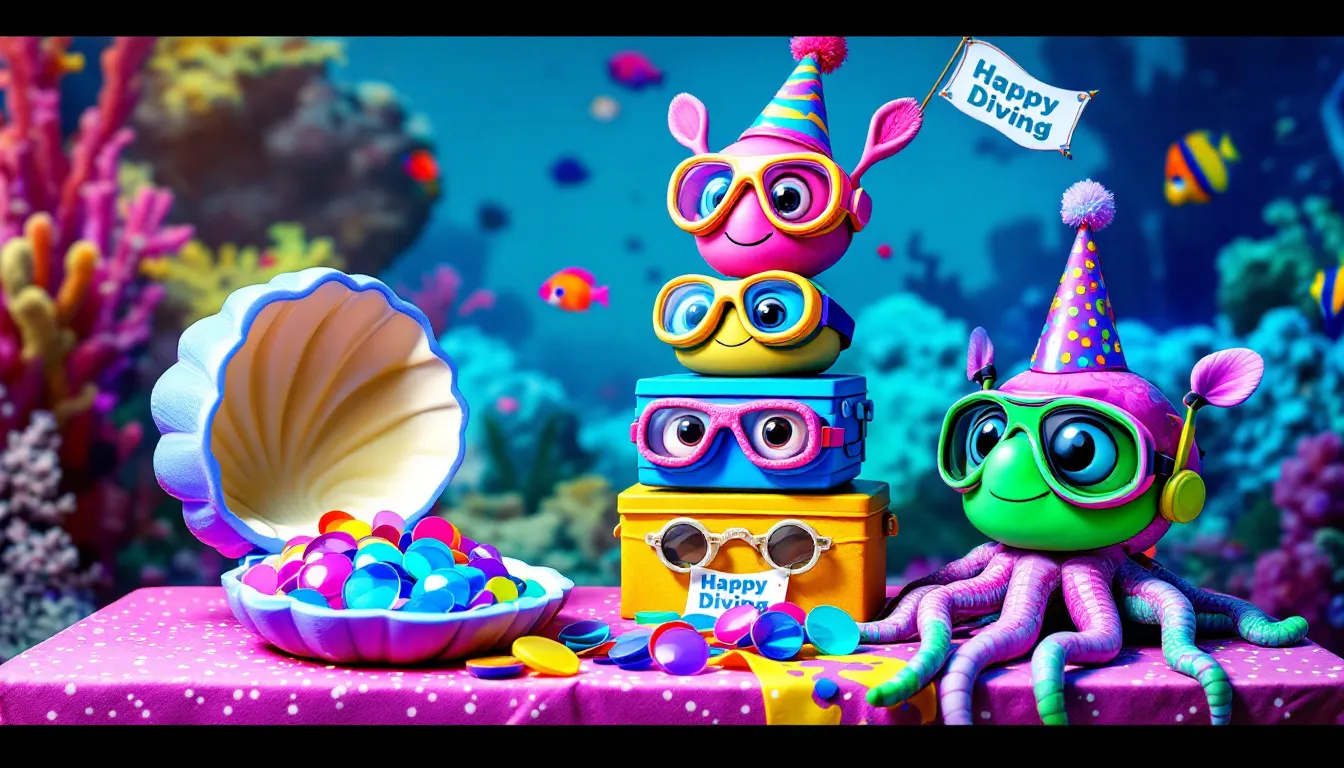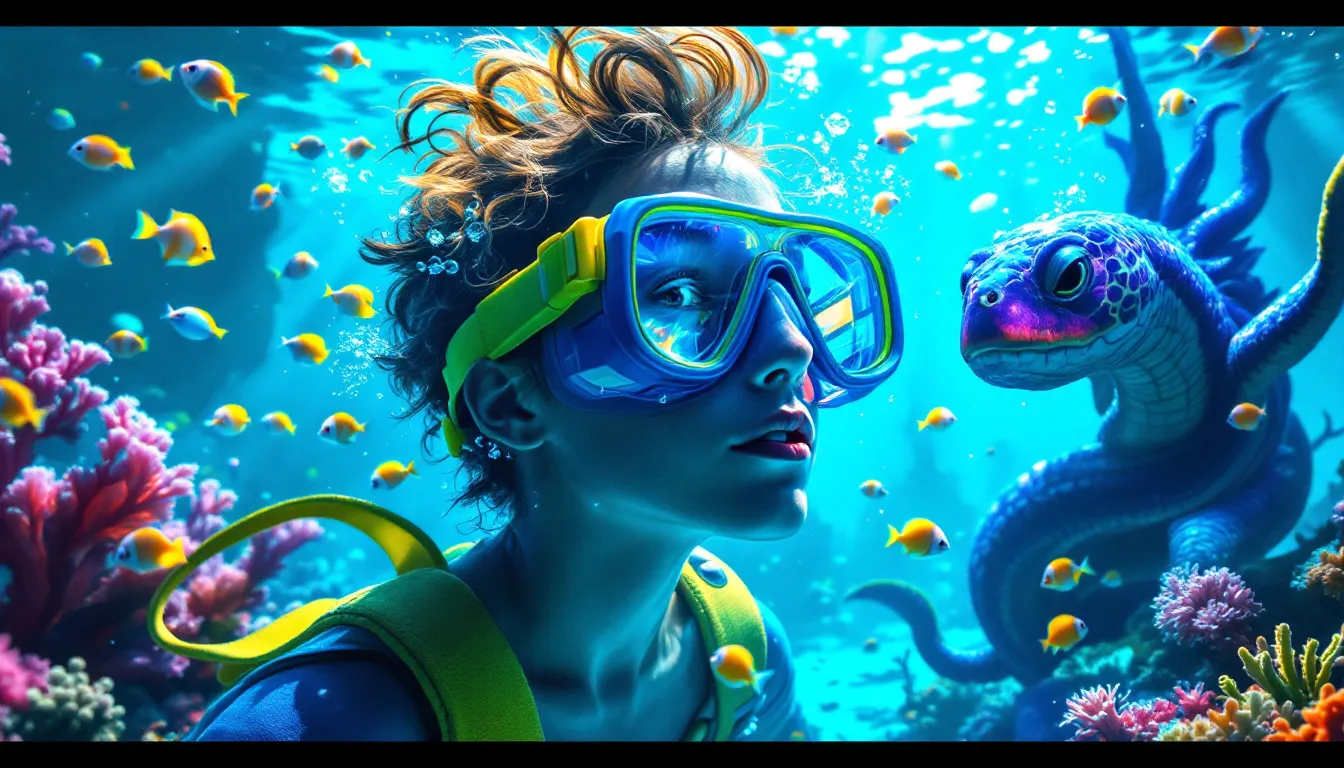Diving With Glasses: Best Tips for Clear Vision Underwater
Peter Letts Mar 20, 2022
Wondering if you can go diving with glasses? Unfortunately, traditional eyeglasses don’t work well with dive masks. But don’t worry—this guide will show you the best alternatives for clear vision underwater, including prescription dive masks and contact lenses. Read on to find the perfect solution for your diving needs.
Key Takeaways
-
Wearing regular glasses while diving is unsafe as they disrupt the mask seal and can cause discomfort.
-
Prescription dive masks and contact lenses are the best alternatives for clear underwater vision, each having unique advantages.
-
Proper maintenance and understanding of vision changes underwater are essential for a safe and enjoyable diving experience.
Why You Can't Wear Glasses While Diving

If you’ve ever tried to wear glasses under a dive mask, you know it’s a recipe for disaster. The main issue is that glasses interfere with the mask seal, which is crucial for keeping water out. Once water starts seeping in, it not only blurs your vision but also increases the risk of pressure issues, which can affect your safety underwater.
Furthermore, wearing glasses under a diving mask can be extremely uncomfortable. The frames can dig into your skin, and the pressure from the mask can cause headaches and even pain. This makes it impractical and unsafe to wear glasses while scuba diving.
In the world of scuba diving, comfort and safety are paramount. Unfortunately, traditional eyeglasses simply don’t fit the bill. The good news is that there are several excellent alternatives that allow you to see clearly underwater without sacrificing comfort or safety.
Best Alternatives to Glasses for Divers

Diving requires clear vision, and fortunately, there are several alternatives to wearing glasses underwater. The two most popular options are prescription dive masks and contact lenses. Both have their pros and cons, and the best choice for you will depend on your personal preferences and needs.
Prescription dive masks are designed specifically for underwater use and can be customized to match your prescription. They provide a seamless and comfortable solution for divers who need vision correction. On the other hand, soft contact lenses are another viable option. They offer the flexibility of using any dive mask and are particularly useful for those who don’t want to invest in a prescription mask.
Choosing between a prescription mask and contact lenses can be a tough decision. It often comes down to what you find most comfortable and convenient. Some divers prefer the all-in-one solution of a prescription dive mask, while others appreciate the versatility of contact lenses.
Prescription Dive Masks

Prescription dive masks are a game-changer for divers who need vision correction. These masks are designed to create an airspace that allows for better focus, compensating for the cornea’s diminished focusing ability in water. They can be customized with prescription lenses that match your specific vision needs, providing clear and precise vision underwater. Prescription diving is an essential consideration for those who require visual aids while exploring underwater.
One of the biggest advantages of prescription dive masks is the level of customization they offer. You can choose from a variety of lens options, including those tailored for nearsightedness, farsightedness, and astigmatism. Some popular models, like the Atomics Subframe or Cressi masks, support special insert lenses for prescription adjustments.
Prescription dive masks can be fitted with custom ground lenses or drop-in lenses, which are available at many local dive shops. This flexibility allows you to find the perfect fit and prescription for your needs. The cost of these masks can vary, ranging from $50 to $300 depending on the complexity of the prescription.
For those who prefer a more budget-friendly option, custom optical lens inserts are a great alternative. These inserts fit inside your regular dive mask, providing similar corrective benefits at a lower cost. Whether you choose a full prescription mask or inserts, the key is to ensure a comfortable and secure fit to avoid any leaks or discomfort during your dive.
Prescription dive masks enhance your diving experience by allowing you to see the underwater world with clarity and precision. Investing in a good mask can make all the difference, turning an ordinary scuba dive into an extraordinary adventure.
Contact Lenses for Scuba Diving
For those who are near-sighted, using contact lenses is a viable solution for diving. Soft contact lenses are the only type recommended for diving due to their non-gas permeable contact lenses nature, which prevents them from absorbing water and swelling. They provide clear vision underwater without the need for a prescription dive mask.
When diving with contact lenses, it’s crucial to ensure your mask fits well to prevent seawater from contaminating the lenses. It’s also a good idea to carry extra lenses with you in case you lose one or experience discomfort during the dive. Disposable contact lenses are particularly safe, as they can be discarded after the dive to reduce the risk of infection.
Safety is paramount when you wear contact lenses underwater. Always disinfect your hands before handling your lenses to avoid introducing bacteria. Inform your dive buddy that you’re wearing contact lenses so they can assist you if needed. During training exercises that involve flooding the mask, keep your eyes closed to protect your lenses. Carrying re-wetting drops can also help relieve any discomfort and prevent your lenses from sticking to your eyes during the dive.
Optical Lens Inserts
Optical lens inserts are another excellent option for divers needing vision correction with corrective lenses. These inserts can be used with various types of dive masks, allowing you to retain your favorite mask while still correcting your vision effectively. They provide a versatile and comfortable solution that can enhance your underwater experience.
One of the main benefits of lens inserts is their versatility. You can use different masks without needing a full prescription mask, making them a cost-effective option for frequent divers. Lens inserts can be custom-made to fit inside your mask, correcting vision issues like nearsightedness, farsightedness, and astigmatism.
Choosing lens inserts can also be more budget-friendly compared to custom-made prescription masks. They offer similar corrective benefits at a fraction of the cost, making them an attractive option for many divers. With proper care and maintenance, lens inserts can provide clear vision and comfort for many dives to come.
Stick-On Magnifying Lenses
Stick-on magnifying lenses are an affordable solution for divers who need magnification to read instruments underwater. These lenses can be applied to various eyewear, including dive masks, sunglasses, and safety goggles, providing flexibility and convenience.
The stick-on lenses utilize a patented adhesion technology that ensures they stay in place even when submerged. To install them, ensure that both the lenses and the mask surfaces are clean, and warm the lenses before application. Different magnification strengths are available, ranging from +1.25 to +3.0, allowing you to choose the strength that best suits your needs.
For reading gauges and other small print underwater, masks designed with built-in reader lenses are also an option. These stick-on lenses provide a simple and effective solution for enhancing your underwater vision without the need for a full prescription mask.
Vision Changes Underwater

The underwater world is magical, but it also presents unique challenges for our vision. Water magnifies vision due to refraction, causing objects to appear 33% larger and 25% closer than they actually are. This natural magnification can benefit divers with mild prescriptions, allowing them to see more clearly underwater.
The bending of light rays underwater enhances visual clarity for some divers, but it can also lead to complications like blurred vision. Understanding these changes is crucial for ensuring a safe and enjoyable dive. For instance, those with more severe vision issues may still require additional vision correction to achieve optimal clarity.
Clear vision is essential for navigating underwater environments, reading instruments, and staying safe. By understanding how vision changes underwater and using the right corrective measures, you can ensure a more enjoyable and incident-free diving experience.
Post-Eye Surgery Diving Considerations
If you’ve undergone eye surgery, it’s important to consult your ophthalmologist before returning to diving. Surgical incisions affecting eye integrity or serious conditions like glaucoma may contraindicate scuba diving. Only return to diving after complete healing and receiving clearance from your surgeon.
Starting with controlled dive environments can help assess your recovery post-surgery. This cautious approach ensures that you can safely enjoy diving without risking your eye health.
Maintenance Tips for Your Prescription Dive Gear
Maintaining your prescription dive gear is essential for ensuring clear vision and longevity. Before each dive, rinse your prescription mask with fresh water to eliminate any dust or debris. After diving, thoroughly rinse your mask to remove salt, sand, and chlorine.
Avoid using harsh chemicals or abrasive cleaners on your dive mask, as they can damage the materials. Using an anti-fog solution on the inside of the mask lenses can prevent fogging during dives.
Regular inspections for cracks or wear can help identify issues early and extend your mask’s lifespan.
Choosing the Right Option for You

Choosing the right vision correction option for diving is crucial for safety and enjoyment. Prescription dive masks provide a seamless solution, enhancing safety and alleviating discomfort from poorly fitting goggles or irritating contact lenses. However, soft contact lenses offer flexibility and are particularly useful for those who prefer not to invest in a prescription mask.
Consider your preferences, comfort, and cost when making your decision. Clear vision while diving is essential for navigating underwater environments and enjoying your diving experience to the fullest.
Summary
In summary, clear vision is essential for a safe and enjoyable diving experience. Whether you choose prescription dive masks, contact lenses, optical inserts, or stick-on magnifying lenses, each option offers unique benefits. By understanding your needs and preferences, you can find the perfect solution to enhance your underwater adventures.
Frequently Asked Questions
Can I wear my regular glasses while scuba diving?
You shouldn't wear regular glasses while scuba diving, as they can cause water to fill your mask and create discomfort. It's best to use prescription dive masks instead.
Are soft contact lenses safe for scuba diving?
Absolutely, soft contact lenses are safe for scuba diving since they don’t absorb water or swell, ensuring you maintain clear vision while exploring underwater. Just make sure to follow proper hygiene practices to keep your eyes healthy!
How do prescription dive masks work?
Prescription dive masks work by incorporating lenses tailored to your specific vision needs, ensuring you have clear and accurate vision while diving. It's a game changer for underwater clarity!
What are optical lens inserts?
Optical lens inserts are custom lenses designed to fit inside your dive mask, providing a practical and economical way to correct your vision underwater. They make your diving experience much clearer and more enjoyable!
Can I dive after eye surgery?
You should only dive after you've fully healed and received the go-ahead from your surgeon. It's best to consult your ophthalmologist for personalized advice.


